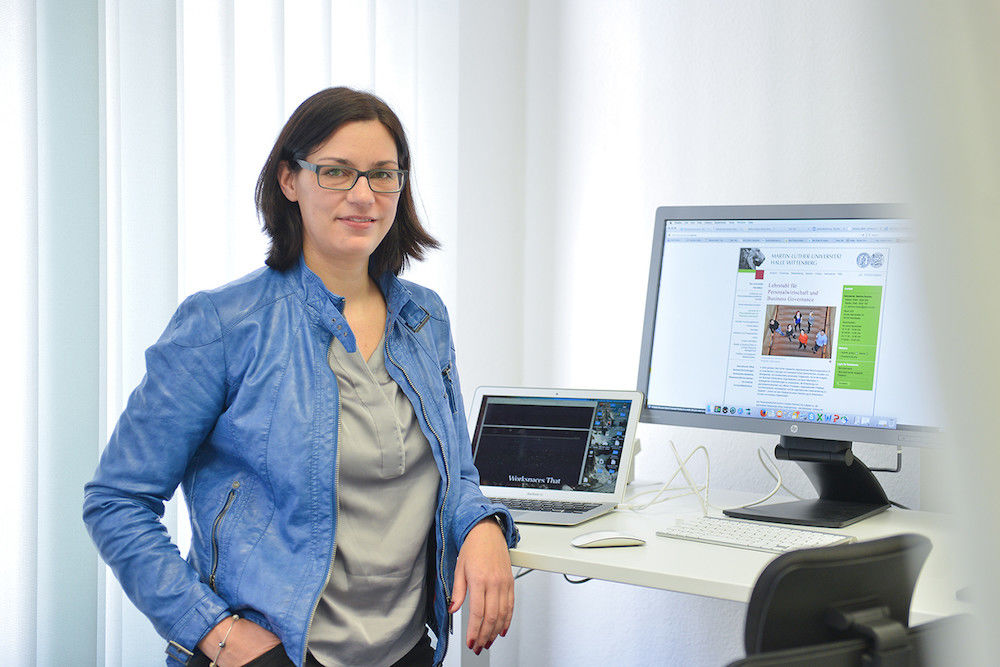Working without a desk and office?

Are you always able to cooperate well virtually?
Anne-Katrin Neyer: I try to implement it in many areas. However, this goes hand in hand with the problem that, as a scientist studying this field, you become over-critical in many areas when you work in a virtual team yourself. For example, it’s exciting when you work on an article about virtual cooperation and then, as part of the virtual work, you realise that it would be so much easier if we were all sitting around a table discussing it! Virtual communication can be arduous and sometimes only works to a certain degree. It repeatedly throws up new questions that need answering. I am, as it were, my own research subject.
Let’s say my company has employees in different countries and time zones – how do I organise this effectively?
The most important thing is to be aware of cultural differences. For example a smiley in an e-mail can be perceived very differently by people in different cultures. It’s about defining clear tasks. Virtual rooms need to be created in which people from different departments can meet by chance outside of meetings.
Facebook and other companies are currently developing enormous office complexes in which even the coffee machines are strategically placed: instead of one coffee machine in every department, there is now one amazing space where everyone goes for coffee and to informally exchange ideas. We used to call it a cafeteria. (She laughs.) But it shows that many companies now want to foster cross-departmental collaboration. We still need more interdisciplinary research on what this would look like in a virtual context.
Do you have to communicate more when you only work together virtually?
Teams have to find a common level of communication. People send out e-mails and then wait for a response. The problem is they don’t have any internal rules in place governing how quickly e-mails should be answered. In such cases it would be easier to meet in the hallway to follow up with the person. Creating certain rules within a team is relevant for all teams, but even more so in a virtual context.
What can individuals do to improve virtual cooperation?
Always keep in mind that it is only a person at the other end of the line. In one of my current papers, a colleague from London and I look at the impact individual goals have on the exchange of knowledge in virtual teams. What’s exciting is that more knowledge is exchanged in virtual teams when every individual follows his or her own goal. An opposite effect is found in face-to-face teams. What I’m trying to say is this: aspects of social interaction that work when there is face-to-face contact can trigger exactly the opposite effect in virtual contexts. This means you need a lot of sensitivity and the guts to inquire about something.
How do you prepare people well for digital labour or virtual work?
A study by researchers at Oxford indicates that nearly half of the 700 professions studied could disappear in the courses of digitalisation, particularly professions in the areas of transport, logistics, office administration and production. Thus, one of the questions we have to grapple with is what it means to have machines that can get along without humans. At this point, the educational system needs to be improved – not at university or vocational training level, but in schools. We need to give children and adolescents the skills to keep pace with this trend. There is a very controversially discussed book called “Digital Dementia” which looks at the erroneous belief that children and adolescents are “digital natives” who understand what it means to work digitally and how to deal with information. I hold a similar view: they often don’t know how to do this. It’s not the same as liking something on Facebook or chatting on WhatsApp.
Which tools do you use and what do you use them for?
I frequently use Skype, particularly to exchange ideas with my colleagues or to develop new ideas together. When we work virtually on an article, we can answer quick questions using the chat function or we can motivate one another when we need a little push in the right direction. It’s like a virtual pat on the shoulders. I’m constantly using Dropbox. Occasionally I work with Google Docs, however in this case it is important that everyone on the team agrees that it is actually efficient to use this tool to work jointly and concurrently on an article. When I need to present my state of research, I like to use the German Research Network’s web-conference system. Here, Adobe Connect allows you to transmit audio and video and the participants have access to uploaded files at the end of the meeting.
What role does the office play as a workplace in the future? Will it disappear?
There are certainly a lot of people who don’t care whether they have a personal workplace or not. They can just as easily sit in the lobby of a hotel, as long as there is a Wi-Fi connection and good coffee. But I would maintain that offices won’t disappear as long as they continue to be status symbols. And I also don’t think this should happen. There are too many different expectations of a workplace. For many people, this space, which they can shape themselves, is critical in allowing them to get their work done. In order to do justice to this heterogeneity we need to better understand – particularly in this age of digitalisation and virtualisation – how we want to work and what we expect from our workplaces.
